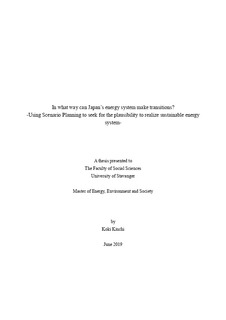| dc.contributor.advisor | Midford, Paul | |
| dc.contributor.author | Kiuchi, Koki | |
| dc.coverage.spatial | Japan | nb_NO |
| dc.date.accessioned | 2019-10-14T11:41:30Z | |
| dc.date.available | 2019-10-14T11:41:30Z | |
| dc.date.issued | 2019-06 | |
| dc.identifier.uri | http://hdl.handle.net/11250/2621976 | |
| dc.description | Master's thesis in Energy, Environment and Society | nb_NO |
| dc.description.abstract | The thesis researches about plausibility of how Japan’s energy system make transitions. Incorporating Multi-Level Perspective (MLP) and Complex Adaptive System (CAS) as the theoretical frameworks, the thesis analyzed Japan’s historical energy transition as well as basic structure of interdependency in relation to the system’s transition. Based on this analysis, the thesis articulates 4 scenarios of Japan’s energy transition by 2030 and make an implication for necessary transition managements. On the process of making scenarios, the thesis incorporated Scenario Planning as a research method. The major finding of this research is that each scenario is a product of different actors becoming the main system drivers for different reasons, and that depending on who will be the new niche regime and why, the scenarios differ tremendously. On this point, how consumers are involved with energy production and how consumers value energy is of great influence. Because energy is a substitutable commodity that there is no much variance in the product’s quality, without marketizing social and environmental values on it, the market competition would easily converge toward lowering price and cost (and eventually deteriorate profitability) through huge capital investment into scale effect. As a result, capitals, resource, and political power are centralized to a certain actor. Another finding is that putting pressure on politician and METI, the administrative organ in charge of monitoring the fair trade in energy industry, is a key if one wants to keep energy industry away from political cartelization of the incumbents. In this case, the pressure is preferably derived from a social awareness on the issues of the current configuration and is accompanied with citizen’s active participations and investments. | nb_NO |
| dc.language.iso | eng | nb_NO |
| dc.publisher | University of Stavanger, Norway | nb_NO |
| dc.relation.ispartofseries | Masteroppgave/UIS-SV-IMS/2019; | |
| dc.subject | samfunnsovergang | nb_NO |
| dc.subject | sustainable development | nb_NO |
| dc.subject | societal transition | nb_NO |
| dc.subject | bærekraftig utvikling | nb_NO |
| dc.subject | energi, miljø og samfunn | nb_NO |
| dc.title | In what way can Japan’s energy system make transitions? -Using Scenario Planning to seek for the plausibility to realize sustainable energy system- | nb_NO |
| dc.type | Master thesis | nb_NO |
| dc.subject.nsi | VDP::Social science: 200 | nb_NO |
| dc.subject.nsi | VDP::Technology: 500::Environmental engineering: 610 | nb_NO |
